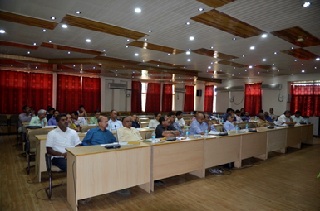Workshop on Integrated Farming System Organized at ICAR Research Complex for NEH Region, Umiam.
The ICAR Research Complex for NEH Region, Umiam Meghalya organized a one day workshop on Integrated Farming System (IFS) on 27 April, 2017 to identify the efficient IFS models for each state/agro-climate based on different monitorable variables such as income, soil quality, productivity, nutrient recycling, energy use efficiency, employment etc. Total 45 Scientists/ Assistant Professors/Professors/Research Fellows/Technicals from different ICAR institutions, Agricultural Universities of the Hill ecosystems of India attended the workshop. Integrated Farming system is considered as one of the most climate resilient approach and mostly suitable for small and marginal farmers. However, locations specific farming components are required to be intelligently identified to harness complementarities between enterprises to achieve optimum productivity from unit area and getting higher returns and bio-resource flow within the system.
During inaugural session Dr Anup Das, Principal Scientist, Division of Crop Production welcomed the participants from different ICAR Institutions and CAU. Dr. K.P. Mohapatra, Sr. Scientist Forestry, briefed about the purpose of conducting this workshop. He narrated that the RCM in its last meeting held at Agartala during 2015 recommended for holding such workshop to identify few efficient IFS models from amongst the many models available in the region.
Dr. A.K. Tripathi, Head Division of Social Sciences and Nodal Officer, KVKs urged to screen out the most profitable and resource conserving farming system models from among the IFS models developed by the ICRA/CAU/State Agricultural Universities for their possible replication in the farmer’s field through KKVs.
Dr S.V. Ngachan, Director, ICAR Research Complex for NEH Region, Umiam and Chairman of the programme during his inaugural remark informed to the house that the objective of the workshop is to identify 5-10 models for the region from the already available standardized models for further upscaling in farmers field. Adoption of IFS would reduce farmers risk and make farming resilient to climate change.
During technical session Dr Pradeep Dogra, Principal Scientist, ICAR-IISWC, Dehradun suggested the multi-criteria decision making tools to grab multiple objectives in IFS models. Farmer’s interest should be considered while designing the IFS components but replicability of these model is complex and probable replicability is very low. Thus, approach should be farmer specific models. Dr. D.J. Rajkhowa, Joint Director, ICAR Nagaland Centre stressed upon the component selection, energy utilization and energy balance for allocation of resources. Dr. K. Kandpal, Joint Director, ICAR Tripura Centre emphasized on identification and standardization of IFS components based on Land Capability Classification. Dr. D. Mahanta, Scientist, ICAR VPKAS, Almora highlighted four IFS models for small and marginal farmers having area 01 ha to 0.25 ha for North Western Himalayan region.
Dr. Anup Das, Principal Scientist presented the 10 farming system models developed by ICAR Umiam; Meghalya out of which 8 were based on the micro watershed land use and one for sloping land and one for small and marginal farmers of valley lands. During presentation he suggested that there is need to finalize a modest amount based on the ICMR recommendations for requirement of food to fulfil the need of the hill farmers. Dr. K.P. Mohapatra, Senior Scientist (Forestry) and Dr. R. Rajappa presented the Agro-forestry based intensive IFS models for efficient utilization of resources and higher land and water productivity. Dr. Arnab Sen, Principal Scientist, Animal Health, suggested that biosecurity measures and animal and human health issue should be taken into consideration while designing farming system models. Dr. G. Kadirvel, Principal Scientist, Animal Production suggested that pigs breeding as against only fattening should be promoted in farming system for obtaining higher profit.
During interaction meeting based on the scientific data and validations most efficient and productive IFS model for each state was suggested by the each state representative. Dr. S.V. Ngachan, Director, ICAR, Umiam suggested for adopting the Fish based farming system models for valley land, Animal and Agroforestry based IFS for sloppy land and Horticulture based faming system especially for higher altitudes. Promotion of Integrated Organic Farming System is also the need of the hour considering the fact that most states are moving toward organic farming in NEH region. Watershed based IFS approach is most suitable for natural resource conservation and food security in NEH Region, he added.
After detailed presentation, deliberations and interactions among various experts following state wise IFS models for North East India were identified for further upscaling in the region
Recommended Integrated Framing System Model 1. Rice+Horticulture (vegetables, orange/ kiwi fruit)+Pig/Poultry+ Others
- Rice + Fish + Vegetables+ Others (Valley areas)
- Horticulture (kiwi, broccoli, citrus) +Pig/Poultry + Others (Hills)
- Fish + Horticulture + Poultry + Others for Mid altitudes
- Dairy based IFS
- Agroforestry Based IFS
1. Horticulture (fruits & vegetables) + Pig+ Others
- Livestock (Pig) based IFS
- Agri. + Horti. + Pig/Poultry+ Others
1. Agri. + Horti. (vegetables, spices, fruits) + Cattle + Backyard poultry + Others
- Agri. + Horti. + Poultry based IFS (Tilla land)
- Rice + Fish + Vegetable (Valley land)
It was agreed to submit details about the IFS models within a week time by the respective Institutes/Universities for compilation and submission to Member Secretary, RCM for further necessary action. At the end of the session Dr. Anup Das, Head Division of Crop Production proposed the vote of thanks. Drs. Subhash Babu, M. Thoithoi Devi, N. Deshmukh, Samir Das, Scientist and R. Rajappa were the rapporteurs dung the technical session of the workshop.

